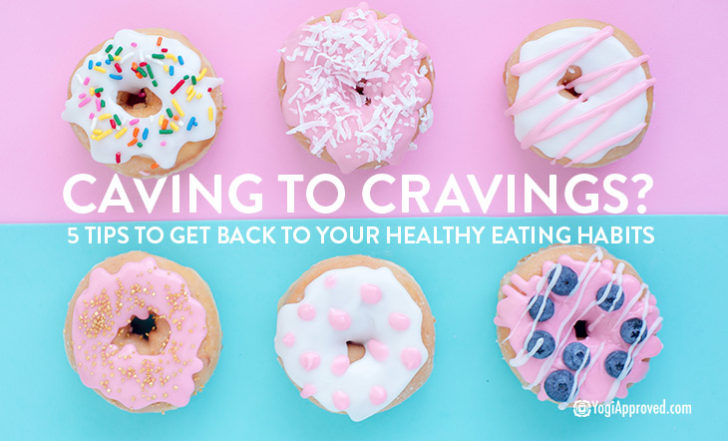This Simple Hack Will Help Curb Your Late Night Binge Eating

Over the years you may have gone through many phases of preferred late-night snacks. For me, in high school it was crackers and cream cheese, college was microwave popcorn and pizza, and more recently it’s been and frozen cherries and chocolate.
Something about eating late at night appeals to lots of us, and even now some of us aren’t sure why exactly. During the day we may follow a healthy diet with planned meals and snacks, but after dinner it’s like a free-for-all in the kitchen!
Late-night snacking is a difficult habit to break. While an obvious solution would be to not buy tempting snacks in the first place, that isn’t always the most realistic option. Maybe we have roommates or family members who also keep food in the house.
Plus, being healthy doesn’t have to mean never again snacking late at night. For many of us it’s an activity that we legitimately enjoy, and it would be so sad if we thought we could never do it again.
Ultimately, as with most things in life, the key with late-night snacking is finding a balance. Snacking every night and having too much at a time can have a negative impact on our health, but indulging in a sensible portion every once in a while is perfectly ok.
Mindful Eating Vs. Binge Eating
Mindful eating comes from mindful meditation, which has deep roots in Buddhism, and focuses on the whole eating experience. It’s actually much more than just eating slowly and paying attention to your food; mindful eating focuses on the physical sensations, thoughts, emotions, and the external environment that go along with eating.
Want to know more about mindful meditation? Check out: 8 Mindful Meditation and Mindfulness Websites / Apps
With mindful eating there’s no right or wrong way to eat, there’s just increased awareness of the process. Studies have shown that mindful eating can help curb binge eating. So how exactly can we use mindful eating to stop binge eating?
Glad you asked! Below are the practices that have taught me how to stop binge eating and transform my late night eating habits. These mindful eating tips will help you do the same.
Learn How to Stop Binge Eating With These 3 Mindful Eating Techniques:
1. Listen to Your Body
I know, I know, this is the most basic advice ever, but honestly, in our fast-paced lifestyles we are SO BAD at listening to what our bodies tell us about hunger. Most of our meals are predetermined based on our daily schedules with little thought given to when we’re actually hungry.
We squeeze in meals when we have the time (or when we’re told to) and frequently don’t get a chance to feel our hunger satisfied before moving on to the next thing.
Mindful eating focuses on the physical sensations, thoughts, emotions, and the external environment that go along with eating.
Plus, our needs are actually more fluid than we think. Some days our bodies need more nourishment than others, but most of us operate as if we should have the exact same amount of meals and calories every day.
These practices make us pros at ignoring our hunger and fullness cues, which promote overeating or eating when we’re not hungry at night. We may have had a perfectly satisfying dinner, but if we’re craving something sweet after dinner, you better believe we’re going to eat it!
To practice listening to your body more, start checking in with yourself before eating to see if you’re actually hungry. And don’t only do this at night; take a couple of seconds before you eat anything to determine whether or not you’re hungry.
Additionally, don’t ask yourself simply “Am I hungry?” Ask yourself a more pointed question: “Am I hungry enough to eat an apple or a carrot right now?” You’ll be more likely to give yourself an honest answer, and if your answer is yes, you can always try eating that apple or carrot to see if it satisfies your cravings.
2. Recognize emotional hunger
Once you’ve become more adept at noticing hunger cues, the next step is determining whether they’re caused by physical or emotional hunger. Do you know how to tell the difference? Here are several indicators to look for:
- Sudden vs. Gradual Hunger: Emotional hunger is sudden while physical hunger is gradual.
- Specific vs. General Hunger: Emotional hunger is for a specific food (read: craving), while physical hunger is open to different foods.
- “Above the Neck” vs. In the Stomach: Is your hunger happening in your mind and mouth or in your stomach?
- Guilt-Inducing vs. Satisfying: Emotional hunger causes guilt while physical hunger causes satisfaction and contentment.
If you determine you’re experiencing emotional hunger, think of something you can do besides eat. Your body doesn’t need nourishment at that particular moment, so anything you eat will be in excess. Try going for a walk, calling a friend or drinking some water. Or try waiting it out – sometimes if you wait just 30 minutes you’ll notice the strength of the craving starts to diminish.
3. Create healthy eating environments
When was the last time you sat down to a snack and gave it your full attention?
Snacks (even the ones late at night) should be treated the same as meals: remove distractions and try to notice your thoughts, emotions, and physical sensations while you eat.
Take time to notice the colors and textures of your food and think about where it came from. Notice what thoughts are circling around in your head and whether you have judgments about what you’re eating. Try to only eat in the kitchen or at a table in order to prevent mindless eating or trying to multitask.
Mindful Eating Is a Practice You Can Use to Stop Binge Eating
The most important thing to remember is that even though mindful eating can reduce binge eating, adopting these practices won’t change your late night snacking habits overnight. Eating mindfully is like building a muscle — it takes time and consistent use before it becomes powerful.


This Month's Letter
From the Editor
Monthly motivation and food for
thought from our founder.































Comments